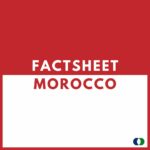The agricultural sector, which today still accounts for around 34 percent of all jobs, is of central importance. State structural programs support it with the aim of creating a sustainable and environmentally conscious agriculture. The country’s infrastructure is being steadily expanded. Since 2018, Morocco has had the first high-speed rail system in Africa. Several major ports have also been opened or are under development since the early 2010s. There are state-of-the-art universities such as Mid-Park with research facilities for nanotechnology and microelectronics. Morocco is also home to the world’s largest solar power plant and the expansion of renewable energy is flourishing.
 Economically, a modern transport and telecommunications infrastructure, low production costs and proximity to the European market speak in favor of Morocco. In addition, investment incentives and tax benefits attract the automotive industry (assembly, subcontracting), aviation and call centers.
Economically, a modern transport and telecommunications infrastructure, low production costs and proximity to the European market speak in favor of Morocco. In addition, investment incentives and tax benefits attract the automotive industry (assembly, subcontracting), aviation and call centers.
The Covid 19 pandemic hit the tourism sector hard, accounting for nearly one-fifth of GDP in 2019. In addition, agriculture was hit by drought, resulting in a seven percent contraction in GDP in 2020. However, the government rose to the challenge and established a strategic investment fund to support the private sector and restructure social security and the network of state-owned enterprises. This is expected to make the economy more stable in the medium and long term.
- Ministère de l’Agriculture, de la Pêche Maritime, du Développement Rural et des Eaux et Forêts (EN, FR and AR)
- Ministère de l’Aménagement du Territoire National, de l’Urbanisme, de l’Habitat et de la Politique de la ville (FR)
- Ministère de la Culture et de la Communication (EN, FR and AR)
- Ministère de l’Economie et des Finances (various languages)
- Ministère de l’Education Nationale, de la Formation Professionnelle de l’Enseignement Supérieur et de la Recherche Scientifique (FR and AR)
- Ministère de l’Energie, des Mines et du Développement Durable (EN, FR, AR)
- Ministère de l’Equipement, du Transport, de la Logistique et de l’Eau (FR and AR)
- Ministère de la Famille, de la Solidarité, de l’Egalité et du Développement Social (FR and AR)
- Ministry of Foreign Affairs and International Cooperation (EN, FR and AR)
- Ministère des Habous et des Affaires Islamiques (FR and AR)
- Ministère de l’Industrie, de l’Investissement, du Commerce et de l’Economie Numérique (EN, FR and AR)
- Ministère de la Jeunesse et des Sports (FR and AR)
- Ministry of Justice and Freedoms (AR)
- Ministère de la Santé (FR and AR)
- Ministère du Tourisme, du Transport Aérien, de l ‘Artisanat et de l’Economie Sociale (various languages)
- Ministère du Travail et de l’Insertion Professionnelle (EN, FR, AR and Amazighe)
- Chambre de Commerce, d’Industrie et de Services (Agadir) (FR)
- Chambre de Commerce, d’Industrie et de Services (Casablanca) (FR)
- Chambre de Commerce, d’Industrie et de Services (Rabat-Salé-Kénitra) (various languages)
- Chambre de Commerce, d’Industrie et de Services (Tanger-Tétouan-Al Hoceima) (FR, EN, AR and ES)
- German Chamber of Commerce and Industry in Morocco (AHK) (DE and FR)
- Fédération des Chambres Marocaines de Commerce, d’Industrie et de Services (Facebook)
- Africa Intelligence (EN and FR)
- Africatimes (EN)
- Afrik-News (FR)
- Agence Marocaine de Presse – Moroccan Press Agency (various languages)
- Al-Alam (AR)
- Albawaba (EN and AR)
- allAfrica (EN and FR)
- Al Maghribia (AR)
- Assabah (AR)
- Bayane Al Yaoume (AR)
- EIN News (EN)
- Jeune Afrique (FR)
- La Nouvelle Tribune (FR)
- L’Economiste (FR)
- Le Matin (FR)
- L’Observateur (FR)
- Maroc Press (EN, FR and AR)
- Menara (FR and AR)
- Morocco World News (EN)
- NewsNow (EN)
- ReliefWeb (EN)
- The Economist (EN)
- Agence Nationale pour l’Efficacité Énergétique (EN, FR, AR and ES)
- AMDI – Agence Marocaine de Développement des Investissements (EN, FR and AR)
- Bank al-Maghrib (Central Bank) (EN, FR and AR)
- BMZ Morocco (DE and EN)
- Bourse de Casablanca – Casablanca Stock Exchange (EN, FR and AR)
- Center Régional d’Investissement de l’Oriental (FR)
- Center Régional d’Investissement du Grand Casablanca (CasaInvest) (EN, FR, AR and TF)
- Center Régional d’Investissement (Rabat – Salé – Kénitra) (FR)
- Center Régional d’Investissement Tanger – Tétouan – Al Hoceima (FR)
- CGEM – Confédération Générale des Entreprises du Maroc (FR and AR)
- The travel guide – Morocco (DE)
- GIZ Morocco (DE and EN)
- Goethe Institute Morocco (DE and FR)
- Information Exchange Morocco (DE)
- L’Agence de l’Oriental (FR)
- Moroccan Forum – information and discussion (DE)
- ONEP – Office Nationale de l’Electricité et de; l’Eau Potable (ONEP – Water Department) (FR and AR)
- ONEP – Office Nationale de l’Electricité et de l’Eau Potable – Industry Electricité (ONEP – Electricity Department) (FR and AR)
- Secrétariat d’Etat auprès du Ministre de l’Equipement, du Transport, de la Logistique et de l’Eau, Chargé de l’Eau (FR and AR)
- State Tourist Office of Morocco (various languages)
- Sympathie Magazine – Morocco (DE)
Current tenders
